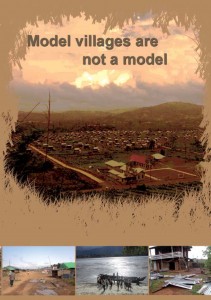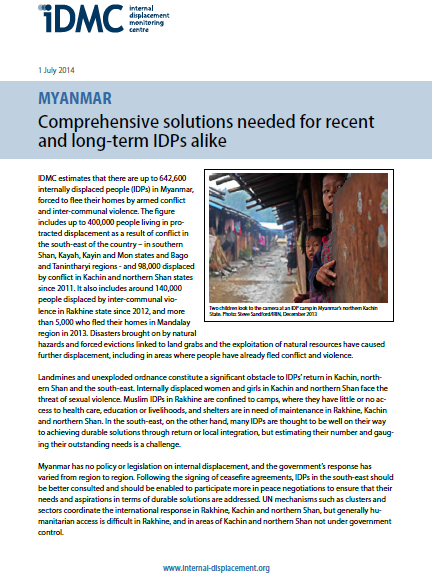Posts Tagged ‘Myitsone Dam’ (31 found)
Myanmar: Comprehensive Solutions Needed for Recent and Long-term IDPs Alike
IDMC estimates that there are up to 642,600 internally displaced people (IDPs) in Myanmar, forced to flee their homes by armed conflict and inter-communal violence. The figure includes up to 400,000 people living in protracted displacement as a result of conflict in the south-east of the country – in southern Shan, Kayah, Kayin and Mon states and Bago and Tanintharyi regions – and 98,000 displaced by conflict in Kachin and northern Shan states since 2011. It also includes around 140,000 people displaced by inter-communal violence in Rakhine state since 2012, and more than 5,000 who fled their homes in Mandalay region in 2013. Disasters brought on by natural hazards and forced evictions linked to land grabs and the exploitation of natural resources have caused further displacement, including in areas where people have already fled conflict and violence.
Landmines and unexploded ordnance constitute a significant obstacle to IDPs’ return in Kachin, northern Shan and the south-east. Internally displaced women and girls in Kachin and northern Shan face the threat of sexual violence. Muslim IDPs in Rakhine are confined to camps, where they have little or no access to health care, education or livelihoods, and shelters are in need of maintenance in Rakhine, Kachin and northern Shan […]
• • •Kachin Group Slams China’s New CSR Report on Irrawaddy Dams
A Kachin group today criticized the new corporate social responsibility report on the controversial Irrawaddy dams, calling for a locally-led development process, not one benefiting only China […]
• • •Model Villages Are Not a Model
 This short report by Mungchying Rawt Jat (MRJ) documents cases of farmers who have been forcibly relocated to make way for “development” projects in Kachin State, and are now staying in Sanpya camp in Hugawng Valley, and Aung Myin Thar and Maliyang camps near the Irrawaddy Myitsone.
This short report by Mungchying Rawt Jat (MRJ) documents cases of farmers who have been forcibly relocated to make way for “development” projects in Kachin State, and are now staying in Sanpya camp in Hugawng Valley, and Aung Myin Thar and Maliyang camps near the Irrawaddy Myitsone.
Harvard Plan to Restart Irrawaddy Dams Will not Buy Peace
A recent proposal by a Harvard University think-tank to restart the Irrawaddy-Myitsone dam project in order to “power the peace process” in Kachin state fails to address the political root causes of the conflict […]
• • •China Power Investment Seeks Backing of Global Dam Industry to Push Ahead with Myitsone Project
Chinese media last week revealed that the International Commission on Large Dams (ICOLD) is currently conducting an “independent” inspection of the Irrawaddy Myitsone dam, being built by China Power Investment Corporation (CPI), to prove that the dam is completely safe and beneficial. Such a study would be a major boost in CPI’s bid to push ahead with the suspended project […]
• • •Burma Army Moves in to Enforce Eviction Order at Myitsone
On March 17 five Burma army trucks and various government vehicles entered Tanghpre village at the Irrawaddy Myitsone dam site in an apparent attempt to enforce an eviction order and intimidate people to move out from the village […]
• • •Villagers Relocated from Myitsone Dam Area Appeal to Return Home
Civilians from Aung Myin Tha village submitted an appeal letter to Kachin State Minister and Government administration on March 14, 2012, requesting to return to their original villages due to the inhabitability of the relocation areas. They also reported the issues they are currently facing relating to the construction of the Myitsone Dam […]
ေအာင္ျမင္သာစံျပေက်းရြာေန ေဒသခံျပည္သူမ်ားသည္ မိမိတို႕ေျပာင္းေရြ႕သြားခဲ့ေသာ ေနရာမ်ားမွာ စိုက္ပ်ဳိးေမြးျမဴေရး လုပ္ငန္းမ်ား လုပ္ကိုင္ရန္ ခက္ခဲေသာေၾကာင့္ မိမိမူရင္းေနရပ္ ေက်းရြာမ်ားသို႕ ျပန္လည္အေျခခ်ႏိုင္ရန္ႏွင့္ ျမစ္ဆံုဆည္တည္ေဆာက္မႈႏွင့္ […]
• •Local Communities and Supporters Express Concerns About Development Projects in Burma
As Thein Sein’s government takes small steps towards democratic transition, the people of Burma are expressing concerns about problematic development projects already underway. These projects, many of which are in ethnic states, directly contribute to human rights violations and increased militarization in project areas, as well as having negative social, economic and environmental impacts.
On 1 March, activists from Burma and around the world participated in a Global Day of Action against the Shwe Gas Pipeline Project that cuts across the country from western Arakan State to China. One hundred and thirty organizations from more than 20 countries signed an open letter to President Thein Sein calling for the suspension of the Shwe Gas project. The letter condemned the confiscation of thousands of acres of farmlands and restriction of access to traditional fishing areas for the project, as well as increased militarization and displacement along the pipeline corridor. The project will generate the country’s largest source of foreign revenue at US$29 billion over 30 years. Furthermore, the gas will be exported to China, while around 75% of the people in Burma do not receive electricity from the national grid […]
• • •An Open Letter in Support of the President of Myanmar’s Decision on the Suspension of the Myitsone Dam Project and a Call for a Review of the Hatgyi Dam Project in Kayin (Karen) State
We, the members of Karen Rivers Watch wish to express our appreciation of your government’s decision on the suspension of the Myitsone Dam project in Kachin State . Karen Rivers Watch sees this decision as an important step towards […]
• • •Irrawaddy Dam Suspended, Shwe Gas Project should be Next
Last Friday, Burma’s President announced the suspension of the Chinese-backed Myitsone dam project on the Irrawaddy River, in response to “the desire of the people.” Following this announcement […]
• • •









 All posts
All posts